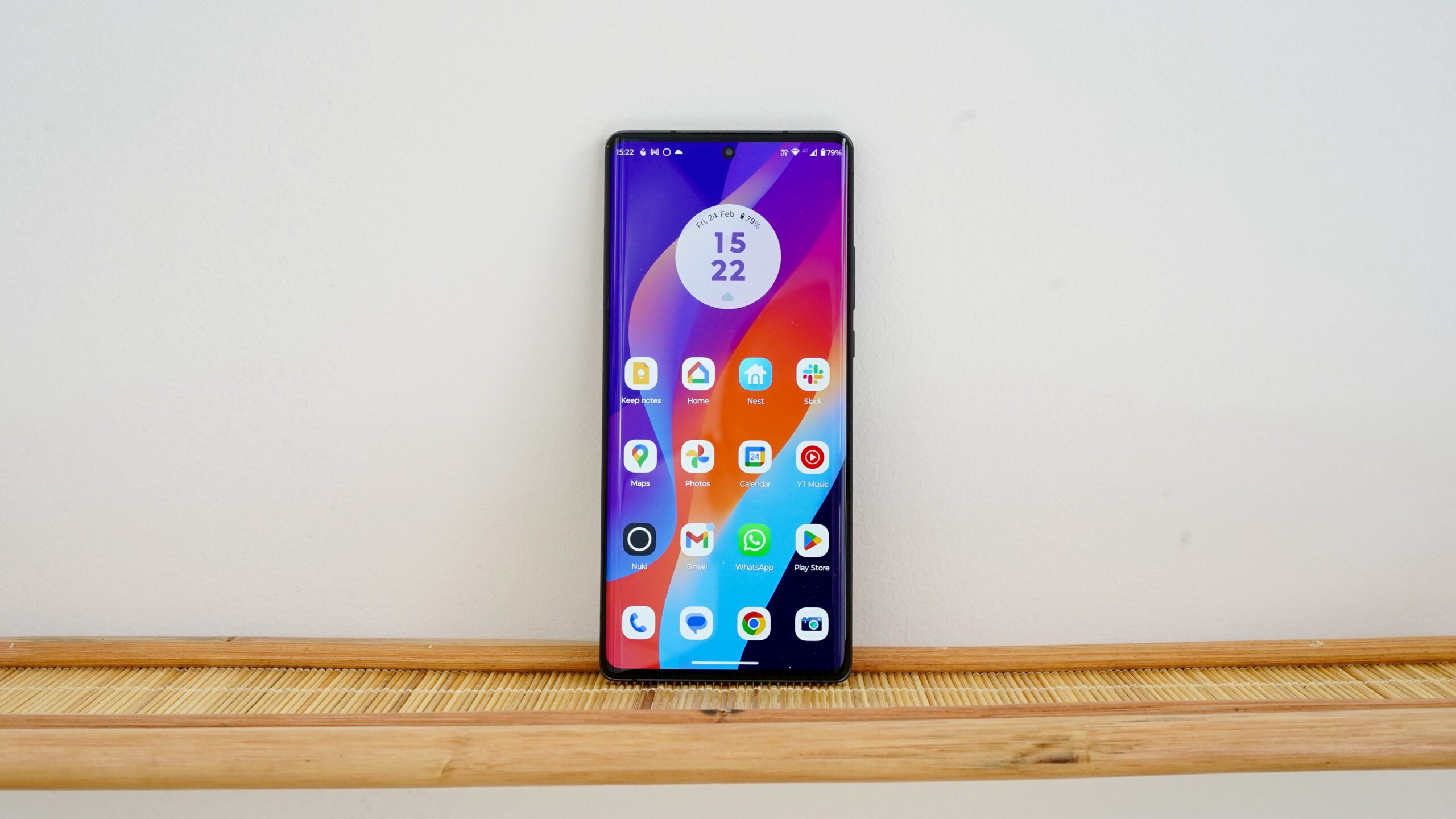Verdict
The Motorola Edge 30 Ultra is a successful return to the flagship fold for the brand, offering a stylish handset with a fine display, strong performance, and one of the cleanest and most pleasant-to-use UIs around. The camera set-up is merely adequate, but Motorola goes above and beyond with its wired and wireless charging provision.
Pros
- Sharp, premium design
- Decent screen with rapid 144Hz refresh rate
- Appealingly clean UI
- Rapid charging – both wired and wireless
Cons
- Disappointing IP rating
- Cameras not quite as good as they seem
- Runs Android 12
Availability
- UKRRP: £749
- USAunavailable
- EuropeRRP: €899
- Canadaunavailable
- Australiaunavailable
-
Speedy wired and wireless chargingBoasting 125W wired and 50W wireless charging support, you’ve got plenty of ways to quickly charge your phone. -
Stylish designThe phone’s design isn’t exactly original, but it has a stylish, tasteful poise for those who appreciate understated class. -
Fast displayThe 144Hz refresh rate of the Edge 30 Ultra is a bit of a rarity outside of gaming phones, offering a buttery-smooth experience.
Introduction
Motorola has been in an on-again, off-again relationship with flagship phones, choosing to devote most of its time and attention to the affordable Moto G family. If previous Motorola Edge phones have seen the brand tentatively attempting to rekindle that flagship flame, however, then the Motorola Edge 30 Ultra sees the brand moving its stuff in and taking on some of the bills.
Launching in September 2022, this is Motorola’s most serious flagship commitment in quite some time, with almost-top-level specs allied to a sleek design and a £749 price tag that would have been classed ‘premium’ not so long ago.
Of course, we’re now some months on from the Motorola Edge 30 Ultra’s launch, and a new breed of mainstream flagship phones has hit the market. It’s still selling for the same price, which pitches it directly up against the Samsung Galaxy S23 and the OnePlus 11. Can the Motorola Edge 30 Ultra still mix it with the best?
Design and screen
- Premium, attractive dual-curved design
- Only IP52 rated
- Sharp, accurate 6.67-inch AMOLED
- Rare 144Hz refresh rate
If Motorola is out of practice with making a flagship phone, it doesn’t show from the outside. The Motorola Edge 30 Ultra sports a lovely premium design, albeit a somewhat derivative one.
Its dual-curved display, sleek glass-and-metal construction, and slightly sparkly ‘Interstellar Black’ finish put me in mind of early 2022’s stealthy Xiaomi 12 Pro. It’s a good look despite that familiarity, and the phone feels good in the hand too.
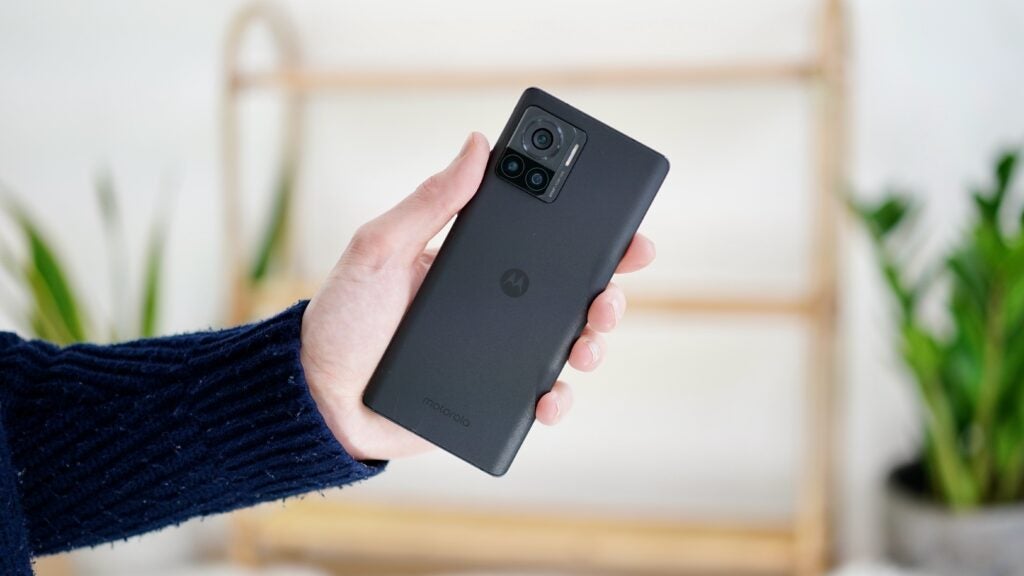
There’s a considerable premium presence to the Edge 30 Ultra, doubtless enhanced by a fairly substantial 199g body. On the flip-side, it’s only IP52 rated, so you don’t get the level of guaranteed water and dust protection that rival flagship phones provide.
A quick note about that dual-curved display – it’s not ideal for picture uniformity or, going by painful past experience, robustness, but nor is this the most pronounced curvature of its kind. It works to make the Edge 30 Ultra feel classy, and it doesn’t distort the picture too much.
Indeed, this is a strong display all round. It’s a vibrant 6.67-inch P-OLED, and while it only hits an FHD+ (2,400 x 1,080) resolution rather than the full QHD+, it goes above and beyond on the fluidity front. Motorola is fairly unique in supporting 144Hz rather than the usual 120Hz peak.
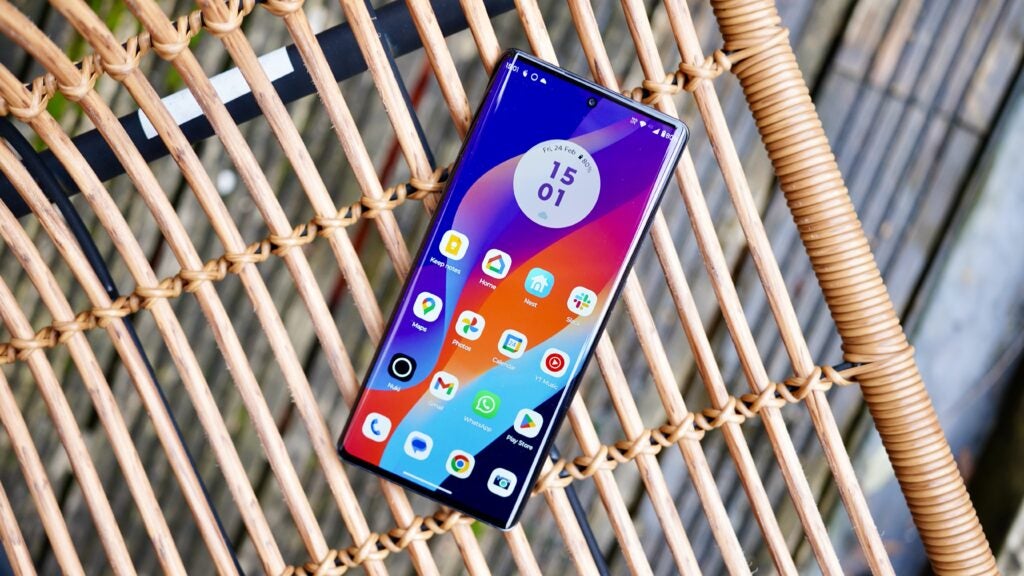
Does it feel any more fluid than the 120Hz OnePlus 11 or iPhone 14 Pro? Not really. The difference is literally smaller and indeed much less noticeable than the jump from 60 to 120Hz, but it’s a cool bragging point nonetheless.
More importantly, the Edge 30 Ultra’s screen is nice and colour-accurate, especially in the preferable Natural colour mode. It supports HDR10+ output too.
Motorola claims a peak brightness of 1250 nits here, though with auto-brightness switched off I measured a maximum brightness of 477 nits. It isn’t up there with the very best and brightest flagship phones on the market, then, but it stands up to daylight viewing just fine.
Camera
- 200MP main camera is good, but not great
- 50MP ultrawide and 12MP telephoto are fairly consistent
- 60MP selfie camera is a bit of a letdown
The Motorola Edge 30 Ultra’s camera system is fronted by a headline-grabbing 200MP main sensor. Don’t equate this with the more recently launched Samsung Galaxy S23 Ultra, however.
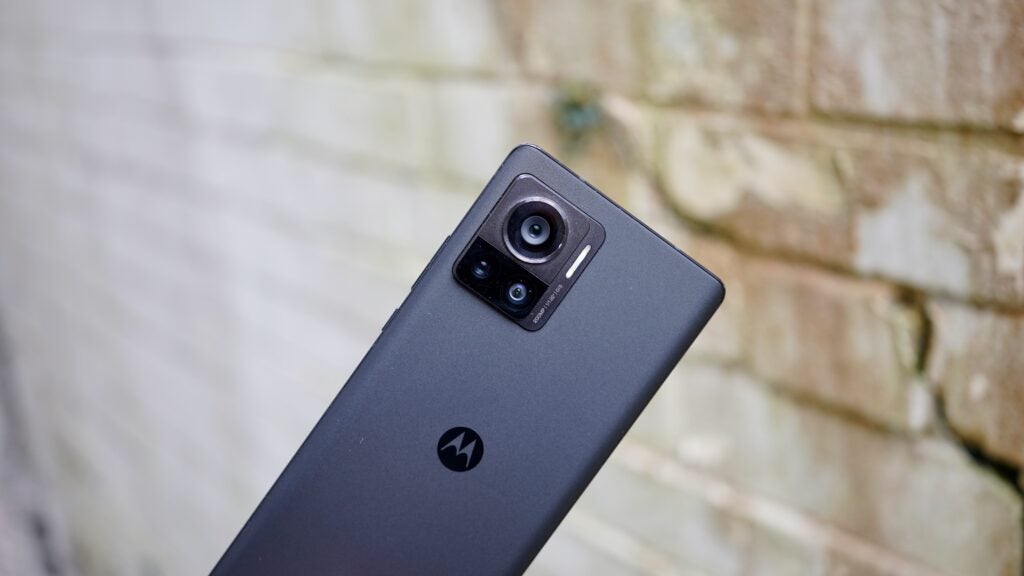
We’re talking about a lower grade of component here in Samsung’s ISOCELL HP1 sensor, which we’ve also seen in the not-quite-flagship Xiaomi 12T Ultra. It’s worth noting, though, that Motorola was technically the first to market with its 200MP sensor.
Images taken with the Edge 30 Ultra’s main camera are decent in good lighting, with the kind of crisp detail you’d hope for with so many pixels floating around. By default, you’ll obtain 12.5MP shots, with a particularly extensive use of the technique known as pixel binning. This means that one pixel will take information from 16 surrounding pixels for improved clarity.

Despite this headline-grabbing feature, shots taken with the Motorola aren’t noticeably better than the top upper-mid-range contenders on the market. They certainly don’t mix it with broadly equivalent efforts from Apple, Samsung, and Google.
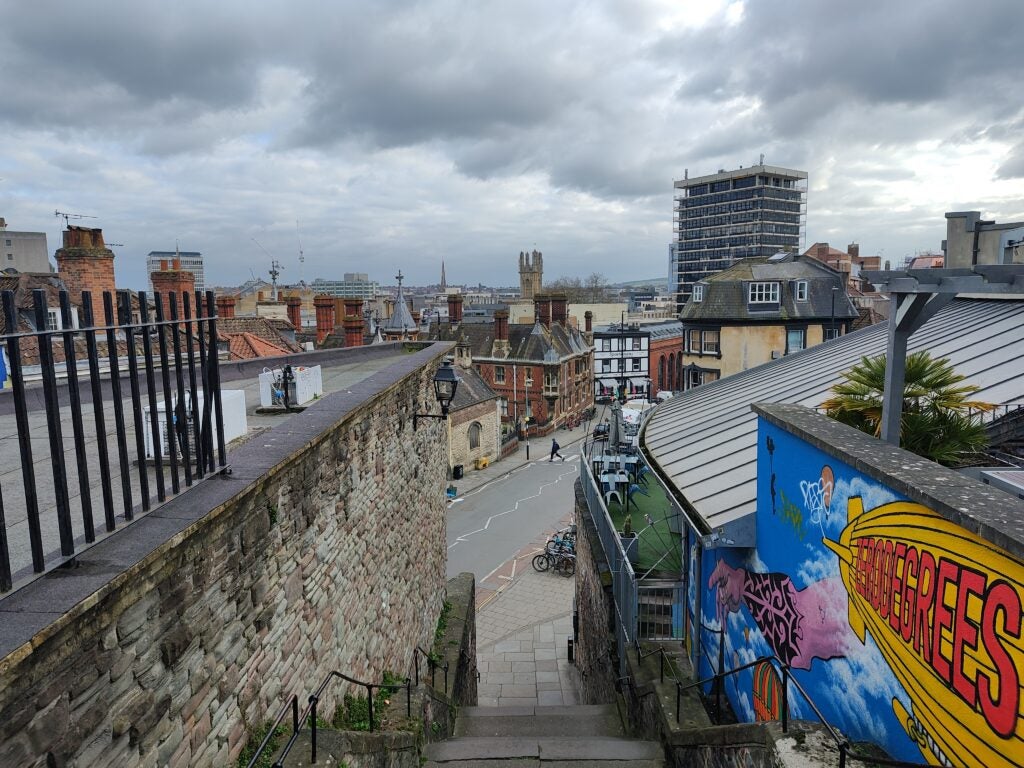
That’s doubly true when shooting in low light. Night shots look respectable, with OIS smoothing out those extended shutter times, but I detected a noticeable amount of grain in darker areas. I also encountered a couple of occasions in less well-lit scenarios – including artificially lit interiors – where the camera simply failed to focus on the subject. Or anything, for that matter.

The phone’s 50MP ultra-wide camera isn’t bad at all, with reasonable detail and a tone that isn’t too far removed from the main camera. You can see that there’s less pop to colours, but it’s a clear step up from the mid-range brigade. This component still falls short of the best, but is a big step above the mid-range crowd.

There’s a 12MP 2x telephoto camera here too, which isn’t a given in a non-pro-level phone these days. It obviously lacks the level of detail provided by that pixel-packed main sensor, but again, I was pleased to see the colour tones in roughly the same ballpark.
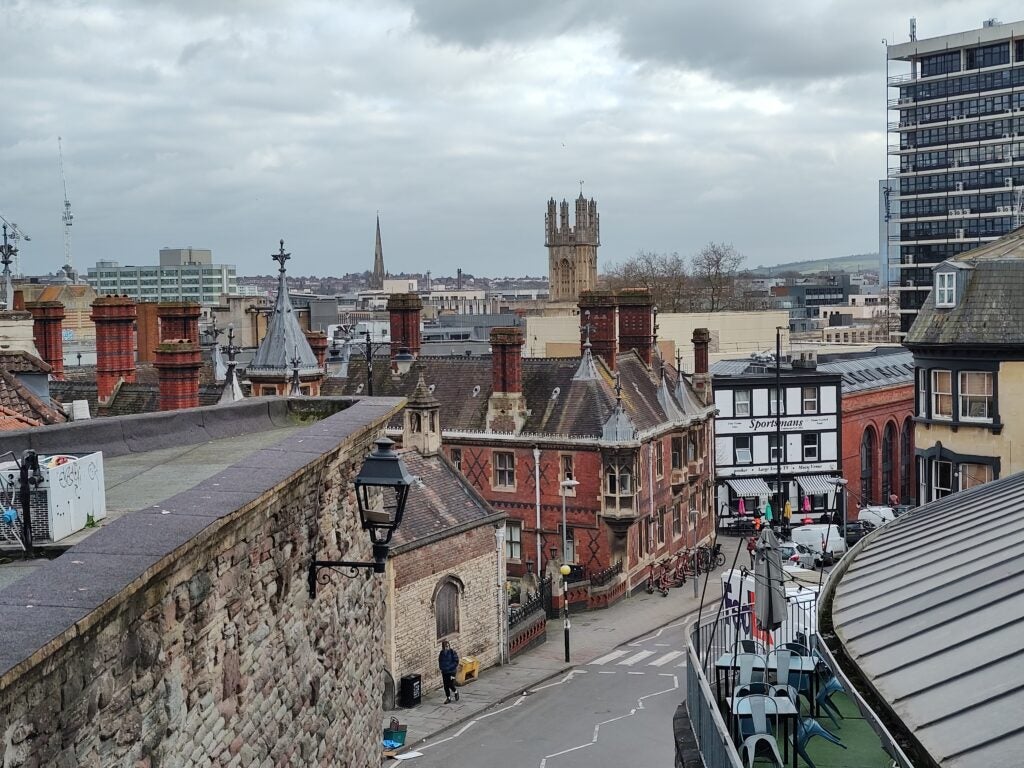
The most disappointing camera here is probably the one on the front. Like the main sensor there’s a surfeit of pixels (60MP for 15MP pixel-binned shots) on offer with the Motorola Edge 30 Ultra’s selfie cam, and also like that main camera, it doesn’t produce the knockout results you might expect.

I found my selfies to be weirdly fuzzy and warm, with little edge definition. An off-puttingly smudged skin tone suggested some form of ‘Beautify’ setting was in play, though I couldn’t find one to toggle off in the camera UI. The provision of a slightly wider selfie angle feels superfluous too, with not enough difference between it and the default angle.
Performance
- Speedy, efficient Snapdragon 8 Plus Gen 1
- Ample 12GB of RAM and 256GB of storage
- Stereo speakers with Dolby Atmos support
The Motorola Edge 30 Ultra runs on Qualcomm’s Snapdragon 8 Plus Gen 1 processor, which was the cutting edge at the time of the phone’s launch in the latter half of 2022. Since then we’ve seen the launch of the Snapdragon 8 Gen 2 in phones like the Galaxy S23 and the OnePlus 11, so Motorola’s flagship can no longer hang with the best.
It’s still very capable indeed, though, and a notable step up from the bulk of last year’s flagship phones running on the Snapdragon 8 Gen 1. The Plus revision runs faster and cooler, and thus more efficiently. It’s also much faster (in regular terms) than the Tensor G2 chip used in the Google Pixel 7 and Pixel 7 Pro, with an average Geekbench 5 single-core score of 1796 and a multi-core score of 4363.
The only Edge 30 Ultra model available comes with 12GB of RAM and 256GB of storage. While it would have been nice to have more storage options in particular, that should be ample for most people.
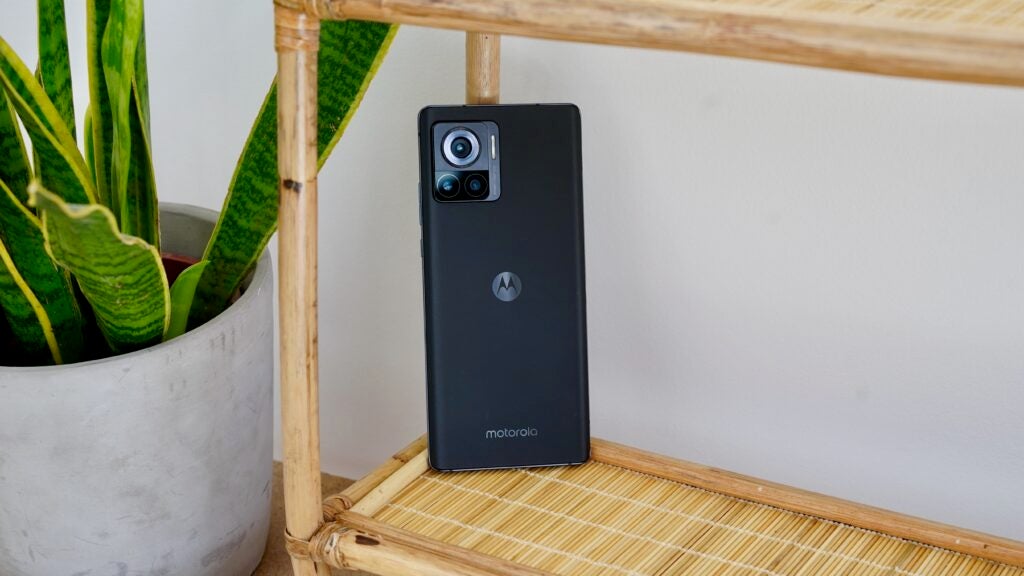
The Motorola Edge 30 Ultra comes with stereo speakers and Dolby Atmos support. They’re not up there with the very best in terms of depth and low-end oomph, but they’re loud and clear and offer decent stereo separation.
It’s a shame to see the Motorola Edge 30 Ultra still stuck on Android 12 in early 2023, but I’d take Motorola’s clean take on this out-of-date OS over any number of heavily customised UIs running on top of Android 13. There will be an update to the latter at some point, too.
The simple, elegant, low-intervention approach that Motorola takes with its software has always been worthy of praise, and it makes the Edge 30 Ultra feel as classy as it looks. It’s not totally stock, but even where Motorola has dabbled, it’s generally been successful.
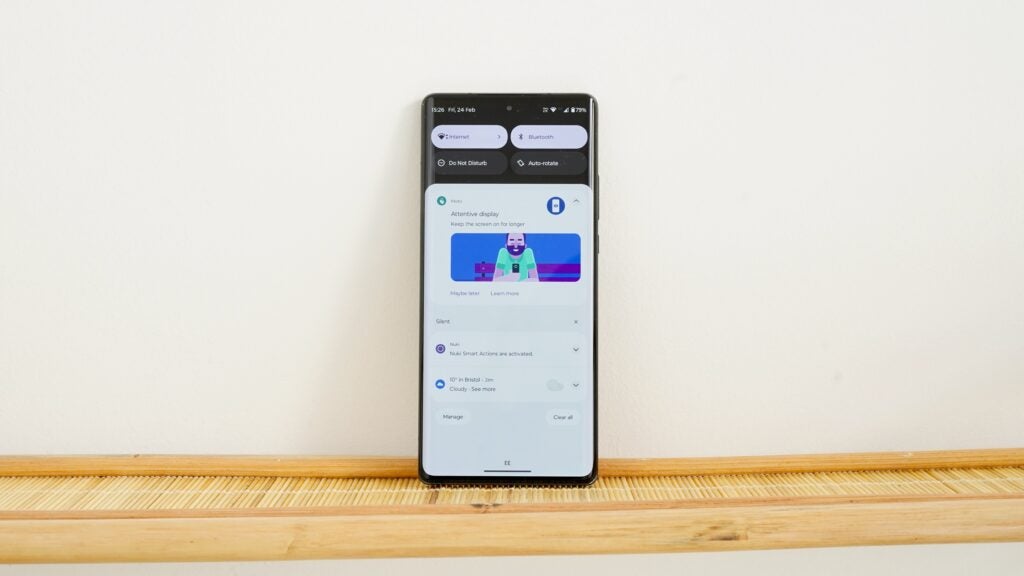
I particularly like Motorola’s lock screen notifications, which let you preview by tapping and holding. Meanwhile, those Moto gestures are as handy as ever in a pinch, particularly the double-twist camera shortcut and a double-chop torch.
Battery life
- Slightly small 4610mAh cell
- Solid all-day performance
- Speedy 125W wired charging
- Unexpected 50W wireless charging
Motorola has packed its latest flagship phone with a slightly smaller-than-average 4610mAh battery. Sure enough, it’s no stamina king, but it’ll get you through a full day of regular usage without worry.
In a 14-hour day with four hours of screen on time – what I’d call the upper end of moderate usage – I found that the Motorola Edge 30 Ultra would be left with around 45% in the tank. That’s not the best battery performance of any flagship phone, but it’s still perfectly adequate – especially given that I had set the screen to run permanently at 144Hz rather than scaling according to the task at hand.
It stood up well to media usage too, with an hour of Disney+ streaming with the screen at 50% brightness sapping 5% of its charge. One hour of YouTube Music streaming sapped 1%. That’s pretty normal for a high-end phone.
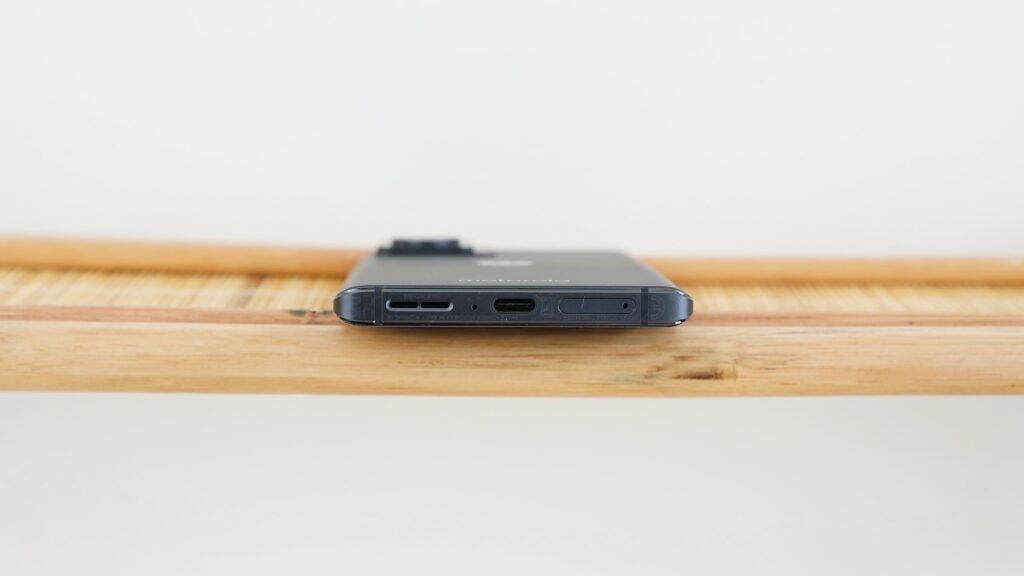
The stand-out spec here is the Motorola Edge 30 Ultra’s charging provision. You get a rapid 125W charger in the box which, in my experience, gets the phone from totally empty to 71% in just 15 minutes.
It took about another 10 minutes (just under 25 minutes in total) to get all the way to 100%, but we’re still talking impressively fast charging here. It certainly puts Samsung’s and Apple’s more expensive offerings to shame, and you get that charger in the box too.
Perhaps even more impressive is Motorola’s support for 50W wireless charging. It’s not uncommon for phones attempting to undercut the flagship brigade to omit any kind of wireless charging (see the OnePlus 11), so this is very good to see.
Latest deals
Should you buy it?
Rapid and flexible charging is a priority:
The Motorola Edge 30 Ultra goes above and beyond with its charging provision. The bundled 125W charger will get you from 0 to 100% in well under 30 minutes, and also features 50W wireless charging.
You’re big on night photography:
The Motorola Edge 30 Ultra isn’t bad at night shots by any means, but nor is it up there with the leading pack.
Final Thoughts
Motorola has offered us a timely reminder that it’s really quite good at this smartphone lark. The Motorola Edge 30 Ultra is its best phone in years, offering an accomplished almost-flagship experience for an almost-flagship price.
It’s fast, handsome, and features a fine 144Hz display. Meanwhile, the phone’s charging set-up puts many a high-profile flagship rival to shame, with extremely rapid wired and wireless provisions. Motorola’s UI continues to be one of the best in the business, too.
Things aren’t perfect: the phone’s camera system isn’t quite as accomplished as it might seem, and its lower IP rating isn’t exactly reassuring. But in day-to-day operation, the Motorola Edge 30 Ultra is simply a pleasure to use.
How we test
We test every mobile phone we review thoroughly. We use industry-standard tests to compare features properly and we use the phone as our main device over the review period. We’ll always tell you what we find and we never, ever, accept money to review a product.
Find out more about how we test in our ethics policy.
Used as a main phone for the review period
Thorough camera testing in a variety of conditions
Tested and benchmarked using respected industry tests and real-world data
FAQs
It can last all day, and well into a second day.
Yes.
6.67 inches.
Yes, and support for 50W wireless charging at that.
Android 12.
Trusted Reviews test data
UK RRP
USA RRP
EU RRP
CA RRP
AUD RRP
Manufacturer
Screen Size
Storage Capacity
Rear Camera
Front Camera
Video Recording
IP rating
Battery
Wirless charging
Fast Charging
Size (Dimensions)
Weight
Operating System
Release Date
First Reviewed Date
Resolution
HDR
Refresh Rate
Ports
Chipset
RAM
Colours
Stated Power
Jargon buster
mAh
An abbreviation for milliampere-hour and a way to express the capacity of batteries, especially smaller ones in phones. In most cases the higher the mAh, the longer the battery will last but this isn’t always the case.
5G
Offering faster download and upload speeds when compared to 4G. Great for game streaming and HDR video playback. Not supported everywhere yet and speeds vary wildly.
OLED and AMOLED
Types of displays that use self-lighting pixels to provide greater contrast and more vibrant colours than a typical LCD display, as well as sharper blacks.
Qi Wireless Charging
The most common format for wireless charging and the one supported by the majority of devices. Charge speeds vary a lot by the phone.
Verdict
The Motorola Edge 30 Ultra is a successful return to the flagship fold for the brand, offering a stylish handset with a fine display, strong performance, and one of the cleanest and most pleasant-to-use UIs around. The camera set-up is merely adequate, but Motorola goes above and beyond with its wired and wireless charging provision.
Pros
- Sharp, premium design
- Decent screen with rapid 144Hz refresh rate
- Appealingly clean UI
- Rapid charging – both wired and wireless
Cons
- Disappointing IP rating
- Cameras not quite as good as they seem
- Runs Android 12
Availability
- UKRRP: £749
- USAunavailable
- EuropeRRP: €899
- Canadaunavailable
- Australiaunavailable
-
Speedy wired and wireless chargingBoasting 125W wired and 50W wireless charging support, you’ve got plenty of ways to quickly charge your phone. -
Stylish designThe phone’s design isn’t exactly original, but it has a stylish, tasteful poise for those who appreciate understated class. -
Fast displayThe 144Hz refresh rate of the Edge 30 Ultra is a bit of a rarity outside of gaming phones, offering a buttery-smooth experience.
Introduction
Motorola has been in an on-again, off-again relationship with flagship phones, choosing to devote most of its time and attention to the affordable Moto G family. If previous Motorola Edge phones have seen the brand tentatively attempting to rekindle that flagship flame, however, then the Motorola Edge 30 Ultra sees the brand moving its stuff in and taking on some of the bills.
Launching in September 2022, this is Motorola’s most serious flagship commitment in quite some time, with almost-top-level specs allied to a sleek design and a £749 price tag that would have been classed ‘premium’ not so long ago.
Of course, we’re now some months on from the Motorola Edge 30 Ultra’s launch, and a new breed of mainstream flagship phones has hit the market. It’s still selling for the same price, which pitches it directly up against the Samsung Galaxy S23 and the OnePlus 11. Can the Motorola Edge 30 Ultra still mix it with the best?
Design and screen
- Premium, attractive dual-curved design
- Only IP52 rated
- Sharp, accurate 6.67-inch AMOLED
- Rare 144Hz refresh rate
If Motorola is out of practice with making a flagship phone, it doesn’t show from the outside. The Motorola Edge 30 Ultra sports a lovely premium design, albeit a somewhat derivative one.
Its dual-curved display, sleek glass-and-metal construction, and slightly sparkly ‘Interstellar Black’ finish put me in mind of early 2022’s stealthy Xiaomi 12 Pro. It’s a good look despite that familiarity, and the phone feels good in the hand too.

There’s a considerable premium presence to the Edge 30 Ultra, doubtless enhanced by a fairly substantial 199g body. On the flip-side, it’s only IP52 rated, so you don’t get the level of guaranteed water and dust protection that rival flagship phones provide.
A quick note about that dual-curved display – it’s not ideal for picture uniformity or, going by painful past experience, robustness, but nor is this the most pronounced curvature of its kind. It works to make the Edge 30 Ultra feel classy, and it doesn’t distort the picture too much.
Indeed, this is a strong display all round. It’s a vibrant 6.67-inch P-OLED, and while it only hits an FHD+ (2,400 x 1,080) resolution rather than the full QHD+, it goes above and beyond on the fluidity front. Motorola is fairly unique in supporting 144Hz rather than the usual 120Hz peak.

Does it feel any more fluid than the 120Hz OnePlus 11 or iPhone 14 Pro? Not really. The difference is literally smaller and indeed much less noticeable than the jump from 60 to 120Hz, but it’s a cool bragging point nonetheless.
More importantly, the Edge 30 Ultra’s screen is nice and colour-accurate, especially in the preferable Natural colour mode. It supports HDR10+ output too.
Motorola claims a peak brightness of 1250 nits here, though with auto-brightness switched off I measured a maximum brightness of 477 nits. It isn’t up there with the very best and brightest flagship phones on the market, then, but it stands up to daylight viewing just fine.
Camera
- 200MP main camera is good, but not great
- 50MP ultrawide and 12MP telephoto are fairly consistent
- 60MP selfie camera is a bit of a letdown
The Motorola Edge 30 Ultra’s camera system is fronted by a headline-grabbing 200MP main sensor. Don’t equate this with the more recently launched Samsung Galaxy S23 Ultra, however.

We’re talking about a lower grade of component here in Samsung’s ISOCELL HP1 sensor, which we’ve also seen in the not-quite-flagship Xiaomi 12T Ultra. It’s worth noting, though, that Motorola was technically the first to market with its 200MP sensor.
Images taken with the Edge 30 Ultra’s main camera are decent in good lighting, with the kind of crisp detail you’d hope for with so many pixels floating around. By default, you’ll obtain 12.5MP shots, with a particularly extensive use of the technique known as pixel binning. This means that one pixel will take information from 16 surrounding pixels for improved clarity.

Despite this headline-grabbing feature, shots taken with the Motorola aren’t noticeably better than the top upper-mid-range contenders on the market. They certainly don’t mix it with broadly equivalent efforts from Apple, Samsung, and Google.

That’s doubly true when shooting in low light. Night shots look respectable, with OIS smoothing out those extended shutter times, but I detected a noticeable amount of grain in darker areas. I also encountered a couple of occasions in less well-lit scenarios – including artificially lit interiors – where the camera simply failed to focus on the subject. Or anything, for that matter.

The phone’s 50MP ultra-wide camera isn’t bad at all, with reasonable detail and a tone that isn’t too far removed from the main camera. You can see that there’s less pop to colours, but it’s a clear step up from the mid-range brigade. This component still falls short of the best, but is a big step above the mid-range crowd.

There’s a 12MP 2x telephoto camera here too, which isn’t a given in a non-pro-level phone these days. It obviously lacks the level of detail provided by that pixel-packed main sensor, but again, I was pleased to see the colour tones in roughly the same ballpark.

The most disappointing camera here is probably the one on the front. Like the main sensor there’s a surfeit of pixels (60MP for 15MP pixel-binned shots) on offer with the Motorola Edge 30 Ultra’s selfie cam, and also like that main camera, it doesn’t produce the knockout results you might expect.

I found my selfies to be weirdly fuzzy and warm, with little edge definition. An off-puttingly smudged skin tone suggested some form of ‘Beautify’ setting was in play, though I couldn’t find one to toggle off in the camera UI. The provision of a slightly wider selfie angle feels superfluous too, with not enough difference between it and the default angle.
Performance
- Speedy, efficient Snapdragon 8 Plus Gen 1
- Ample 12GB of RAM and 256GB of storage
- Stereo speakers with Dolby Atmos support
The Motorola Edge 30 Ultra runs on Qualcomm’s Snapdragon 8 Plus Gen 1 processor, which was the cutting edge at the time of the phone’s launch in the latter half of 2022. Since then we’ve seen the launch of the Snapdragon 8 Gen 2 in phones like the Galaxy S23 and the OnePlus 11, so Motorola’s flagship can no longer hang with the best.
It’s still very capable indeed, though, and a notable step up from the bulk of last year’s flagship phones running on the Snapdragon 8 Gen 1. The Plus revision runs faster and cooler, and thus more efficiently. It’s also much faster (in regular terms) than the Tensor G2 chip used in the Google Pixel 7 and Pixel 7 Pro, with an average Geekbench 5 single-core score of 1796 and a multi-core score of 4363.
The only Edge 30 Ultra model available comes with 12GB of RAM and 256GB of storage. While it would have been nice to have more storage options in particular, that should be ample for most people.

The Motorola Edge 30 Ultra comes with stereo speakers and Dolby Atmos support. They’re not up there with the very best in terms of depth and low-end oomph, but they’re loud and clear and offer decent stereo separation.
It’s a shame to see the Motorola Edge 30 Ultra still stuck on Android 12 in early 2023, but I’d take Motorola’s clean take on this out-of-date OS over any number of heavily customised UIs running on top of Android 13. There will be an update to the latter at some point, too.
The simple, elegant, low-intervention approach that Motorola takes with its software has always been worthy of praise, and it makes the Edge 30 Ultra feel as classy as it looks. It’s not totally stock, but even where Motorola has dabbled, it’s generally been successful.

I particularly like Motorola’s lock screen notifications, which let you preview by tapping and holding. Meanwhile, those Moto gestures are as handy as ever in a pinch, particularly the double-twist camera shortcut and a double-chop torch.
Battery life
- Slightly small 4610mAh cell
- Solid all-day performance
- Speedy 125W wired charging
- Unexpected 50W wireless charging
Motorola has packed its latest flagship phone with a slightly smaller-than-average 4610mAh battery. Sure enough, it’s no stamina king, but it’ll get you through a full day of regular usage without worry.
In a 14-hour day with four hours of screen on time – what I’d call the upper end of moderate usage – I found that the Motorola Edge 30 Ultra would be left with around 45% in the tank. That’s not the best battery performance of any flagship phone, but it’s still perfectly adequate – especially given that I had set the screen to run permanently at 144Hz rather than scaling according to the task at hand.
It stood up well to media usage too, with an hour of Disney+ streaming with the screen at 50% brightness sapping 5% of its charge. One hour of YouTube Music streaming sapped 1%. That’s pretty normal for a high-end phone.

The stand-out spec here is the Motorola Edge 30 Ultra’s charging provision. You get a rapid 125W charger in the box which, in my experience, gets the phone from totally empty to 71% in just 15 minutes.
It took about another 10 minutes (just under 25 minutes in total) to get all the way to 100%, but we’re still talking impressively fast charging here. It certainly puts Samsung’s and Apple’s more expensive offerings to shame, and you get that charger in the box too.
Perhaps even more impressive is Motorola’s support for 50W wireless charging. It’s not uncommon for phones attempting to undercut the flagship brigade to omit any kind of wireless charging (see the OnePlus 11), so this is very good to see.
Latest deals
Should you buy it?
Rapid and flexible charging is a priority:
The Motorola Edge 30 Ultra goes above and beyond with its charging provision. The bundled 125W charger will get you from 0 to 100% in well under 30 minutes, and also features 50W wireless charging.
You’re big on night photography:
The Motorola Edge 30 Ultra isn’t bad at night shots by any means, but nor is it up there with the leading pack.
Final Thoughts
Motorola has offered us a timely reminder that it’s really quite good at this smartphone lark. The Motorola Edge 30 Ultra is its best phone in years, offering an accomplished almost-flagship experience for an almost-flagship price.
It’s fast, handsome, and features a fine 144Hz display. Meanwhile, the phone’s charging set-up puts many a high-profile flagship rival to shame, with extremely rapid wired and wireless provisions. Motorola’s UI continues to be one of the best in the business, too.
Things aren’t perfect: the phone’s camera system isn’t quite as accomplished as it might seem, and its lower IP rating isn’t exactly reassuring. But in day-to-day operation, the Motorola Edge 30 Ultra is simply a pleasure to use.
How we test
We test every mobile phone we review thoroughly. We use industry-standard tests to compare features properly and we use the phone as our main device over the review period. We’ll always tell you what we find and we never, ever, accept money to review a product.
Find out more about how we test in our ethics policy.
Used as a main phone for the review period
Thorough camera testing in a variety of conditions
Tested and benchmarked using respected industry tests and real-world data
FAQs
It can last all day, and well into a second day.
Yes.
6.67 inches.
Yes, and support for 50W wireless charging at that.
Android 12.
Trusted Reviews test data
UK RRP
USA RRP
EU RRP
CA RRP
AUD RRP
Manufacturer
Screen Size
Storage Capacity
Rear Camera
Front Camera
Video Recording
IP rating
Battery
Wirless charging
Fast Charging
Size (Dimensions)
Weight
Operating System
Release Date
First Reviewed Date
Resolution
HDR
Refresh Rate
Ports
Chipset
RAM
Colours
Stated Power
Jargon buster
mAh
An abbreviation for milliampere-hour and a way to express the capacity of batteries, especially smaller ones in phones. In most cases the higher the mAh, the longer the battery will last but this isn’t always the case.
5G
Offering faster download and upload speeds when compared to 4G. Great for game streaming and HDR video playback. Not supported everywhere yet and speeds vary wildly.
OLED and AMOLED
Types of displays that use self-lighting pixels to provide greater contrast and more vibrant colours than a typical LCD display, as well as sharper blacks.
Qi Wireless Charging
The most common format for wireless charging and the one supported by the majority of devices. Charge speeds vary a lot by the phone.


















